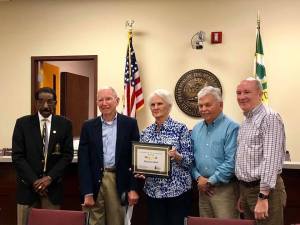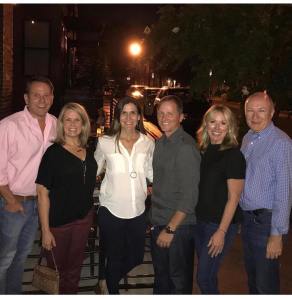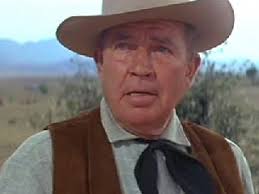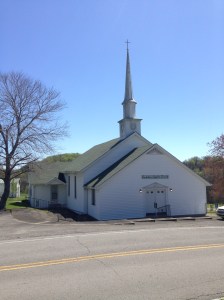Every so often, our city honors a person who has been a business leader and civic leader in our community with the Legends of Lebanon Award.
Last week, that award was given to my dad.
It was a great night. He was thrilled, and the entire family could not have been prouder.
The proclamation reads as follows:
Charles Bell was born in Saulsbury, a community in eastern Wilson County, and grew up on the dairy farm owned by his parents Albert and Pauline Bell. During his childhood, there was no electricity or indoor plumbing, but his parents and his extended family, which included Uncle Chester and Aunt Selma Bell, instilled in him the importance of hard work. During the summers, Charles sold walnuts; counted cars for the state; measured tobacco; and showed his work ethic in various other jobs.
Charles graduated from Watertown High School, where he played football, and moved to Lebanon when he married Elaine Vanhook. He tried a few jobs but found his calling with the help of his father-in-law J.W. Vanhook. Together, they invested in a business to assemble storm doors and storm windows and sell them door-to-door.
From there, Charles formed Lebanon Aluminum Company, known as Le-Al-Co, which he owned and operated for 30 years. Under his leadership and salesmanship, the company grew to employ 400 people and have its products sold in 49 states and Great Britain. Windows and doors manufactured in Lebanon filled the shelves of Home Depot, K-Mart, J.C. Penny and regional hardware chains throughout the country.
Charles also founded Bell Door Company, which produced wooden doors. After several years of operation, he sold the business to Steves and Sons, which has maintained a manufacturing facility in Lebanon since the 1970s and continues to employ over 100 people.
Charles’ business ventures have not been limited to manufacturing. He served on the Board of Directors of Heritage Federal Bank, a Kingsport-based bank that had a branch in Lebanon.
He was also one of the founders and served on the Board of Directors of Wilson Bank and Trust, which is now one of Lebanon’s largest employers.
In addition, he was one of the founders of The Wilson World newspaper, which is now known as The Wilson Post.
Through the years, Charles has believed in serving his community. This began as a member of the Lebanon Jaycees, an organization that led projects such as the building of the Lebanon High School football stadium, which is now the Cumberland University football stadium.
In 1968, Charles was elected President of the Tennessee Jaycees, and, in 1969, he was elected Vice-President of the United States Jaycees. That same year, he was honored as one of Tennessee’s Outstanding Young Men.
When his time in the Jaycees was done, Charles continued to serve in various ways.
He is a 33rd Degree Scottish Rite Mason and a member of Shriners International.
He served on the Governor’s Cabinet as Commissioner of General Services for the State of Tennessee.
He has served on the Board of Trust of Cumberland University and the Belmont University Board of Trust.
For many years, he was a member of the Wilson County Water Authority Board.
A long-time member of Lebanon’s First Baptist Church, Charles has also served the church in many capacities, including Deacon.
Charles has also found time to invest in recreational activities. Never forgetting his time growing up on a farm, he has retained his love for agriculture and created Horn Springs Angus Farms. Through an extensive breeding program, his stock became the highest ranked angus herd in Tennessee and one of the best in the country. During Charles’ time as owner of Horn Springs Angus, cattlemen from throughout the nation traveled to Lebanon to attend the annual production sale.
For almost 25 years, Charles sponsored the Le-Al-Co Storms, a men’s slow pitch softball team that competed in the highest levels of the sport. They won 10 state championships and finished as the second ranked team in the nation in 1991. In 2010, Charles was inducted into the Tennessee Softball Hall of Fame as the sponsor with the most state championships and most wins in Tennessee history.
In 1991, Charles suffered a massive cerebral hemorrhage while attending a meeting in Kingsport, Tennessee. He was 53 years old. Doctors gave him little chance to live and, if he lived, they believed he would be bed-ridden. With the determination and work ethic he displayed in business and community service, Charles went through years of rehabilitation to beat the odds.
He proved the doctors wrong and continued his work with Wilson Bank and Trust and his cattle operation. He also continued to provide a strong foundation for his growing family.
Charles and Elaine have two sons. Jack and his wife Meleia have two sons, Weston and Bronson. Rick and his wife Necole have one daughter, Isabella. Through everything he has done, Charles’ greatest accomplishment has been a loving husband, father and grandfather.










